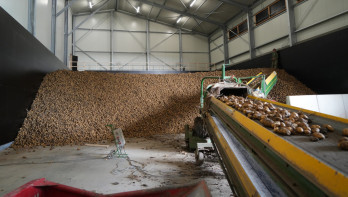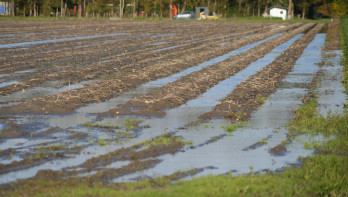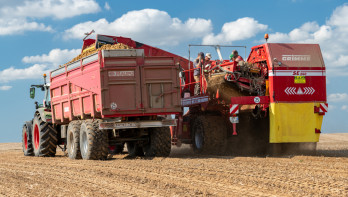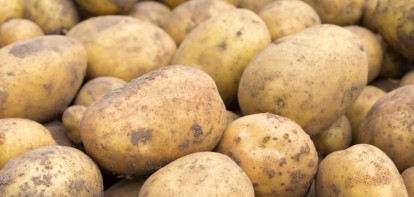Feature Potatoes
A symphony of alarm bells rings in Europe
In all of Europe, the media is now full of a dramatic situation among arable farmers. After a soaking wet spring, with significantly delayed planting dates, the dreaded phytophthora fungus reared its head. You will soon have to pay more for your bag of table potatoes, chips, or portion of fries. Is the situation really as dramatic as portrayed?
It has felt like it has been raining almost continuously between October 10 and June 20, and that's pretty much accurate. The KNMI recorded the twelve wettest months ever and the second wettest spring ever (measured in De Bilt). On average, twice the amount of rain fell between February and May compared to the Dutch average. The national average last year was 1,153 millimeters, but in the past twelve months, it has been 1,246 millimeters.
Western Europe affected
The situation is similar in many European countries, as indicated by data from the European weather agency ECMWF. In parts of France, Belgium, Ireland, and the Netherlands, rainfall records were broken, literally. It was also very wet in Italy, Western Russia, and parts of the Iberian Peninsula. Just this weekend, heavy rainfall in Switzerland caused floods and landslides. Damage to potatoes in Southern Germany - due to floods in May - is estimated at 30% to 40%.
In England, potato growers also report being heavily affected by the weather. SOS (save our spuds) is the cry in the media. East England, one of the most popular potato-growing areas and usually one of the driest parts, had a similar spring to this side of the North Sea. Growers see their production costs continually rising and fear that this will not be compensated. According to Alastair Heath, chairman of the potato department of the NFU (English LTO), the situation is not yet so urgent that supermarket shelves will be empty and Britons will have to eat their beloved fish & chips without those chips.
Fear of phytophthora
In Germany, the mainstream media - like in the Netherlands - report on the spread of phytophthora. Organic growers are heavily affected, but even conventional crops are difficult to keep clean. The range of available treatments throughout Europe has been so reduced that it is noticeable. Curative intervention is almost no longer possible.
At the NAK inspection service, reports of phytophthora outbreaks have been steadily coming in since last week, as technical coordinator Jeroen Winkelhorst explains. "Reports include infected storage plants. Growers will be in violation from July 1 if they do not address potato storage. However, if the storage plants are infected with phytophthora, you are already liable before that time."
Pressure remains high
Warmer and drier weather is preventing further disease pressure, but Winkelhorst warns against false security. "The soil is still wet and giving off moisture. Dew keeps the crop wet in the mornings as well. It's like having a separate microclimate in the crop. Therefore, it is advisable to remain vigilant and stick to the spraying schedule."
There are now also warnings of false mildew in onions. French winegrowers have already been affected, and experts are finding it in crops. Normally, the fungal disease appears in June, but this time it has happened earlier, especially in planting onions. The advice here is that growers must be diligent with crop protection to keep their crops healthy.
Meanwhile, the planting of seed potatoes in the Netherlands is not yet complete. NAK expects that the last seed potato fields will be planted this week. "Work still needs to be done in the Achterhoek and Southwest Netherlands." Some reports have come in from North Holland of seed potato fields that have been completely lost due to heavy rainfall. These growers will be allowed to plant potatoes on these fields next year, as decided by the NAK and NVWA. The AM-free declaration remains valid. "This damage occurred after very large amounts," explains Winkelhorst. "In practice, we see that most fields show sporadic plant loss due to the rain, but rarely an entire field."
Planting nearing completion
In Belgium, according to insiders, potato growers still had about 5% of the area to plant at the end of last week. Together with companies in South and East Netherlands, this represents the last percentage of unplanted area in Western Europe. With possible thunderstorms and rain showers expected at the end of this week, it is anticipated that most potatoes will be planted this week. It is possible that some large growers may still need to plant part of their area after July 1.
Western European potato growers have just experienced the most challenging nine months. This has resulted in a significantly above-average potato price, but the group that can benefit from this is small. It can already be concluded that the peak of the new harvest has passed. However, there are also insiders pointing to increased acreage in France and Germany, places where crops are growing well, and rapid crop development. The cards for the 2024 harvest year have not yet been dealt.




